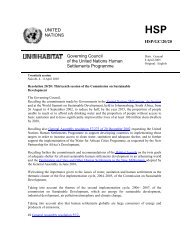Harmonious cities - UN-Habitat
Harmonious cities - UN-Habitat
Harmonious cities - UN-Habitat
You also want an ePaper? Increase the reach of your titles
YUMPU automatically turns print PDFs into web optimized ePapers that Google loves.
Take China for example, which today accounts<br />
for half the global construction volume.<br />
It is also enjoying one of the highest economic<br />
growth rates worldwide. But the China<br />
example needs to be contextualised. It should<br />
not be seen as the recipe for development,<br />
especially in today’s global quest for reduced<br />
consumption patterns. However, the link between<br />
urban development and national development,<br />
correlated to the private sector’s<br />
growth cannot be underplayed.<br />
There is a general fear that the private sector,<br />
in its struggle to meet international competition,<br />
might push governments to adopt<br />
urban policies less dedicated to the needs of<br />
communities or social equality. There is also<br />
concern that local governments are becoming<br />
more visibly market centred, promoting ‘good<br />
business climates’ and courting the private<br />
sector to lure jobs and money. Liberalisation<br />
leads to structural changes with critical implications<br />
for urban policy and planning. It also<br />
has great impacts on urban living conditions.<br />
Civil society is continuously warning the<br />
international community about the danger of<br />
such trends that work to the detriment of the<br />
lower income bracket in society and against<br />
social development and security.<br />
“While we already have decades of experience<br />
working with governments in the developing<br />
world, we now recognise the importance<br />
of working with other development actors,<br />
from grassroots civil society organisations<br />
to multinational enterprises, to ensure that<br />
the poor are not left behind,” said Mr. Mark<br />
Malloch Brown, the former Deputy Secretary<br />
General of the <strong>UN</strong> in a foreword to a <strong>UN</strong>DP<br />
publication entitled, Private Sector: Building<br />
Partnerships for Development.<br />
Preserving safety nets for the urban poor<br />
and strengthening local governance capacity<br />
to balance market forces are important objectives<br />
supported by the <strong>UN</strong>. In fact, it has<br />
to play a critical role in bringing together the<br />
private sector, governments – including local<br />
governments – and civil society to keep a balance<br />
that allows a harmonious urban development.<br />
But while it is increasingly important for<br />
the <strong>UN</strong> to partner with the private sector, global<br />
civil society watchdogs have long warned<br />
about the clashing motives of private sector<br />
players—particularly multinational corporations—and<br />
the <strong>UN</strong>.<br />
While business is about minimising costs<br />
and maximising profits, the <strong>UN</strong> is about<br />
promoting international co-operation on development,<br />
humanitarian assistance, human<br />
rights and security.<br />
The <strong>UN</strong> positions itself here by saying that<br />
the private sector can contribute in several<br />
ways to the realisation of <strong>UN</strong> goals through the<br />
mobilisation of “financial resources, access to<br />
technology, management expertise and support<br />
for programme”.<br />
The <strong>UN</strong> partnership approach intends to<br />
go beyond the so called clashing motives of<br />
businesses and those of the <strong>UN</strong>. To concur<br />
with that approach, the business community<br />
seems to increasingly promote a new discourse<br />
whereby those differences are ironed out.<br />
“What I’m saying to business is that business<br />
cannot succeed in a society that fails -<br />
we have a clear business interest in helping<br />
to create functioning societies that are good<br />
Private sector<br />
IN-FOCUS<br />
places for doing business, otherwise we don’t<br />
have a platform for doing what we’re supposed<br />
to do,” said Mr. Bjorn Stigson, President of<br />
the World Business Council for Sustainable<br />
Development.<br />
To establish successful partnerships between<br />
the private sector and the <strong>UN</strong>, it is crucial<br />
to understand the motives and requirements<br />
of both. At the same time, issues such<br />
as climate change have triggered a new quest<br />
for common objectives. The private sector is<br />
increasingly aware of the importance of sustainable<br />
social and economic development<br />
for the successful conduct of its activities.<br />
Private sector actors also recognise the need<br />
Ph o t o © WBCSd<br />
“Business cannot suceed in a society that<br />
fails.” — Bjorn Stigson, President of the World<br />
Business Council for Sustainable Development<br />
to invest in human resources and infrastructure<br />
in order for businesses to thrive.<br />
They need to invest in the city of<br />
tomorrow. u<br />
u r b a n<br />
November 2008 WORLD 31

















